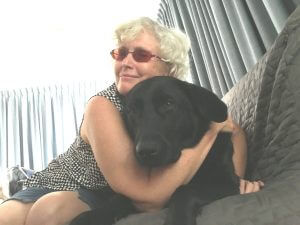The Blind Ones building communities in Brisbane
 Growing up on a remote cattle property in Central Queensland, Narelle Gatti never imagined that the short sightedness she experienced as a child would lead to long term vision impairment.
Growing up on a remote cattle property in Central Queensland, Narelle Gatti never imagined that the short sightedness she experienced as a child would lead to long term vision impairment.
“Being out bush as a child we didn’t have an optometrist or anything. My parents just thought I was clumsy, but it turned out that I was extremely short sighted.
“We had a black and white cat called Topaz and we also had white chooks. One day Dad asked me ‘what’s that out there?’ and I said ‘it’s that bloody old cat Dad’, of course it turned out to be the chooks. Long story short, Mum and Dad took me for an eye test in Rockhampton, but the optometrists never told us there was a chance I would eventually go blind,” Narelle said.
Now in her 50s, Narelle has between five and ten degrees of vision, but says that she doesn’t let that number define her.
“I still have some sight but I don’t even worry about that anymore because it’s just a number. It doesn’t define who I am at all,” she said.
“Basically the retina’s getting really stretched and dying along with the optic nerve collapsing. It’s called myopic degeneration. It’s not very common and it can’t be cured. There’s nothing they can do, as once the optic nerve goes, the sight is gone.”
Narelle was made aware of the full extent of her vision loss when she visited a specialist in 2007.
“I started falling over a lot at work. I went to my optometrist and tests were carried out. Half way through the test the optometrist started crying. She said I was never to drive again. At that stage I had about 30 degrees of sight and since then I have lost most of my sight.”
Having come to terms with the gradual loss of her sight, Narelle has recently turned her attention to influencing society to be more accepting and inclusive of people with vision impairment and blindness, creating a Brisbane-based support network called The Blind Ones.
“My optometrist kept calling me and saying, I need you to talk to this person who is losing their sight. She could see a need for it in her practice. We are here to help. We have lived that journey.
“The whole goal of The Blind Ones, is to be a proactive group working to fix our own issues.
“Working as a team, The Blind Ones can get together to work with the person experiencing the problem to find a workable solution.
“At the moment we are looking at the lack of uniformity in how the braille trail is made.”
The Blind Ones also seek to increase awareness of vision impairment in mainstream society.
“The other morning, I went downstairs to walk my guide dog and I could feel this woman staring as we walked up to her toileting area.
Kassidy is a beautiful pure black, spoilt rotten dog, but please don’t stare as it makes us feel uncomfortable.
“It’s about education, and we as the vision impaired community have got to educate people ourselves, we can’t wait for other organisations to do it for us.”
Narelle recently started receiving support through the National Disability Insurance Scheme (NDIS), which she says has helped maintain her independence.
“The NDIS has given me more freedom. I am learning to walk unsighted now, which I have been working on for a year now and the NDIS has paid for that.
“The NDIS is now funding a talking microwave to help me cook safely. I have burnt a few things so it’s probably a really good idea. I get help with ironing and training in orientation and mobility.”
Narelle, who loves to cook, also has access to cleaners who help keep the kitchen under control.
“They know that I can’t clean very well, so if they know that I am going to do any big cooking, I do it on the day they come. If I am still working on it, one of them will jump in and help me and then they help me clean up,” Narelle shares.
“One day I was trying to cook arancini balls. They walked in and I had got flour and panko crumbs absolutely everywhere. I made a heck of a mess. They just laughed. I got them all ready and then couldn’t see to know how to cook them. I didn’t miss a spot.”
Narelle is supported on her NDIS journey by Peter, a Local Area Coordinator (LAC) for Carers Queensland, NDIS Local Area Coordination Partner in the Community for the Brisbane region.
Carers Queensland can support you to find out more about the NDIS, to apply for funding and to help you get started with the NDIS.
If you have a disability but are not eligible for the NDIS, Carers Queensland can also help you identify and link to options for support in your community.
To find out more about how the NDIS and Local Area Coordination program can work for you, contact Carers Queensland on 1300 999 636, or cq.enquiries@ndis.gov.au

